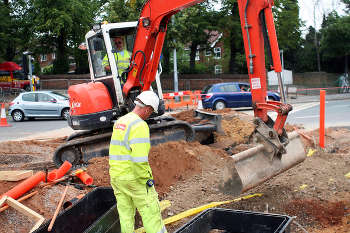Four universities are to share £7m in government cash to develop micro robots that could repair cracks in pipes, with the aim of cutting roadworks and improving worker safety.
A further 14 projects backed by £19.6m in government cash from the Industrial Strategy Challenge Fund (ISCF), will see robots sent to hazardous work places such as offshore wind-farms and nuclear decommissioning facilities.
Researchers will test new technologies, such as the use of artificial intelligence (AI) software on satellites in orbit to detect when repairs are needed, and drones for oil pipeline monitoring.
 Business department BEIS said scientists from four British universities will develop 1 cm-long robotic devices that use sensors and navigation systems to find and mend cracks in pipes, with the aim of significantly cutting the disruption caused by the 1.5 million road excavations that take place every year.
Business department BEIS said scientists from four British universities will develop 1 cm-long robotic devices that use sensors and navigation systems to find and mend cracks in pipes, with the aim of significantly cutting the disruption caused by the 1.5 million road excavations that take place every year.
Science minister Chris Skidmore said: ‘While for now we can only dream of a world without roadworks disrupting our lives, these pipe-repairing robots herald the start of technology that could make that dream a reality in the future.
‘From deploying robots in our pipe network so cutting down traffic delays, to using robots in workplaces to keep people safer, this new technology could change the world we live in for the better. Experts in our top UK universities across the country are well-equipped to develop this innovative new technology.'
Health and Safety Executive chair Martin Temple said: ‘As a regulator we want to encourage industry to think about how technologies such as robotics and AI can be used to manage risk in the workplace, safeguarding workers both now and in the future world of work.’




